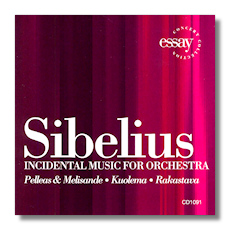
The Internet's Premier Classical Music Source
Related Links
- Sibelius Reviews
- Latest Reviews
- More Reviews
-
By Composer
-
Collections
DVD & Blu-ray
Books
Concert Reviews
Articles/Interviews
Software
Audio
Search Amazon
Recommended Links
Site News
 CD Review
CD Review
Jean Sibelius

Incidental Music
- Pelléas & Mélisande Suite
- Kuolema
- Rakastava Suite
Philharmonia Virtuosi/Richard Kapp
ESS.A.Y CD1091 56:17
Summary for the Busy Executive: More than delightful.
Sibelius wrote most of this music fairly early, before the Third Symphony. The theater provided a badly-needed source of income to the composer and his family. He was glad of the work.
Pelléas et Mélisande was written for the same Maeterlinck play that inspired Fauré, Schoenberg, the late-Romantic Scottish composer William Wallace, and, most notably, Debussy. Sibelius's music shows signs of schizophrenia. On the one hand, you get a kind of general-purpose Masterpiece Theater toniness in some of the numbers. "At the Castle Gate," for example, really rises no higher than Edward German. On the other hand, you get treated to Sibelius's symphonic thinking in others – the lurching into themes, the jagged break-offs of phrases, very apparent in "By the Seashore." Nothing is less than professional here, but it often rises to something much more. The "Pastorale" is a wonderful bit of nature-painting, with a bright palette I associate with the Second Symphony.
I've never understood the affection for the "Valse triste" from Kuolema, but it became the composer's most popular work. The composer saw a grand total of five hundred bucks from a piece that made millions for the publisher. The "Scene with Cranes" I think the superior piece, but it seems a Sibelian byway. For a revival of the play, decades later, Sibelius composed two more numbers, and you can bet he negotiated royalties. Unfortunately, the "Canzonetta" and the "Valse romantique" never took off.
Rakastava began life as a choral piece, written before the First Symphony. It's wonderful, but even Sibelians have trouble finding it. Sibelius rewrote it for strings several years later, expanding themes into separate movements, and, as such, it has enjoyed some success. I prefer the choral incarnation (because I'm perverse). Sibelius was a master choral composer – just think of Kullervo, the piece he wanted to withdraw – and the neglect of this area of his output has bewildered me. You can find the choral music on a terrific two-CD set, North (Naïve 5037), with the world-class French choir Accentus, conducted by the legendary Eric Ericson. You also get works by Jersild, Stenhammar, and Rautavaara, among others.
The late, enterprising Richard Kapp and his Philharmonia Virtuosi could always be counted on for at least interesting programs and wonderful, intimate music-making. Frequently, they aced out better-known conductors and groups. Their Pellés et Mélisande is as good as any out there and shows a deep understanding of Sibelius's artistic world. They put you in mind of the symphonies and the violin concerto. The recording, by the way, comes from live concerts. The sound quality may not scale electronic Everests, but the spontaneity and genuine pleasure in the music more than make up for this.
Copyright © 2007, Steve Schwartz




















